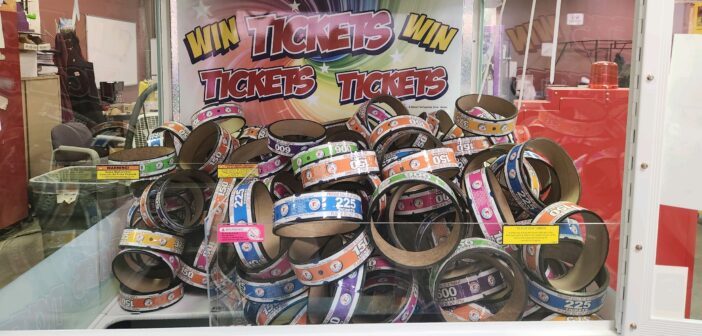Over Four Decades of Innovation
Smart Industries’ Game IQ Is Pretty Smart Indeed

Jeff Smart
From its earliest days setting up traveling arcades in state fairs and running street operations, Smart Industries has kept its eye on trends and its efforts on innovation. Founded by the late Gordon Smart and now run by his son Jeff, who is not only its president but also the leader of the company’s R&D efforts, Smart Industries’ third generation – Jeff’s son Jason – is already well-entrenched, learning the ropes from the ground up as he runs the factory.
Says Jeff Smart, the company’s success is due to many essential links in the chain to keep it anchored to its core values and steered toward game designs that are on-trend (or ahead of them), reliable and money-making.
The secret to their success? Smart says it’s developing and maintaining great business relationships with customers – never taking them for granted – and trying new ideas. “We’d like to take credit for a lot of our ideas, but in reality, a lot of the great ones come from our customers – route operators, FECs and distributors. We listen and get to work,” he said.
“For the last four decades, I’ve been fortunate to have been the head of R&D, something I do more than sales or any of the tasks I do as president. My forte has been working on new ideas and listening to customers.
“Our manufacturing plant and R&D are in Taiwan, so I moved there about five years ago. We have 15 people on our R&D team and I’m fortunate to have them at my disposal. I work directly with them five days a week, week in and week out, updating and upgrading equipment and developing new game ideas.”
Smart has a legacy of creating money-making products for the industry and they’re proud of their achievements. Going back to the mid-1980s, they boast that they were the first company to use a joystick controller on a crane (Clean Sweep), the first with a ticket counting/shredding machine (Ticket Center), and the first to have a “Candy Crane,” a term they say was coined by Gordon Smart in the early 1990s and was trademarked.
Along the way, they’ve built redemption games (remember Feed Big Bertha?) and sports games like basketball shooters in addition to an extensive crane line.
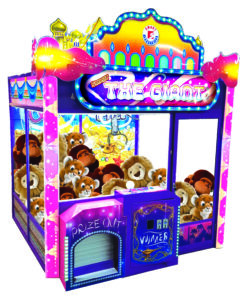
Smart Industries’ giant Taj Mahal with jumbo plush for prizes.
In more current times, the company was all-in on the ticket craze with their Ticket Time, Ticket Time RX and Ticket Ring games (the latter title often occupying the #1 spot for cranes on the RePlay Players’ Choice chart). They have a giant crane called Taj Mahal, which can award plush or giant ticket rings (now patented) as prizes, and have come out with the Taj Mahal Mini.
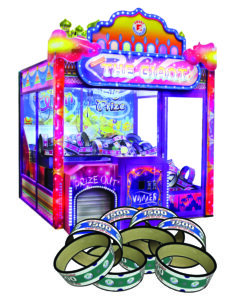
Smart Industries’ giant Taj Mahal, filled with ticket ring prizes.
Also topping the latest in their product lineup is Mega Prize. Smart claims to be the first to introduce such a jumbo-prize, cut-the-string self-merchandiser with its first showing in late 2018. The factory tweaked and further developed the piece with significant numbers arriving in containers on U.S. shores in March 2020 just as Covid came along and pulled the rug out from under the industry’s feet. While other makers have also entered the market with versions of the concept, Smart designers doubled down, introducing a “Winner Takes All” version (profiled in the February 2023 RePlay).
On the occasion of this cover story, RePlay caught up with Jeff Smart and Sales VP Jim Dupree to discuss what it is about Smart Industries’ culture that contributes to its long-term success as well as what might be on the horizon for the Iowa-headquartered game maker:
How has Smart continued its path of success over these many years?
Jeff Smart: The only way to do that is to have excellent business relationships with your customers and to never take your company for granted.
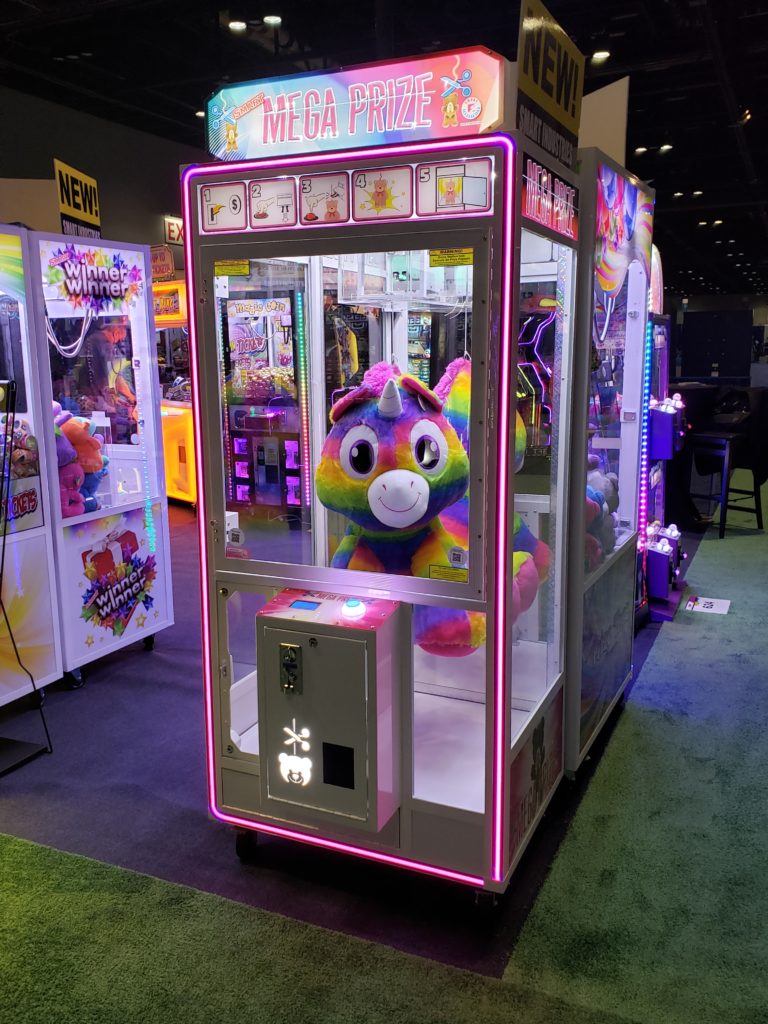
Smart’s Mega Prize has a single prize that the player wins by skillfully cutting the string that suspends it behind the glass.
You must always listen to your customers and try new things. We like to take credit for a lot of our ideas but in reality – and this may be the same for most of the companies in this industry – the best ideas come from our customers. The companies that do the best are the ones who listen to their customers the most. Fortunately for Smart, that’s what we do and how we’ve managed to survive and thrive for over four decades.
While Smart makes games for both the street and FEC markets, it has a reputation for focusing primarily on route operators. Why is that?
Smart: We were street operators before we were manufacturers, so over the years, our business and product has been about working with the street first. And historically, the majority of our business has come from that sector. We’ve developed many relationships with route operators throughout the years, and we hope we continue to learn from them and develop games specifically for that market.
We feel strongly that there’s a big future for coin-operated games in street locations as the market continues to evolve. There’s going to be a lot of opportunity for the route operator.
Post-Covid, there have been a lot of pressures on manufacturers – supply chain, price increases and labor shortages among them. How has Smart been weathering these pressures and what does that say about the company’s resilience?
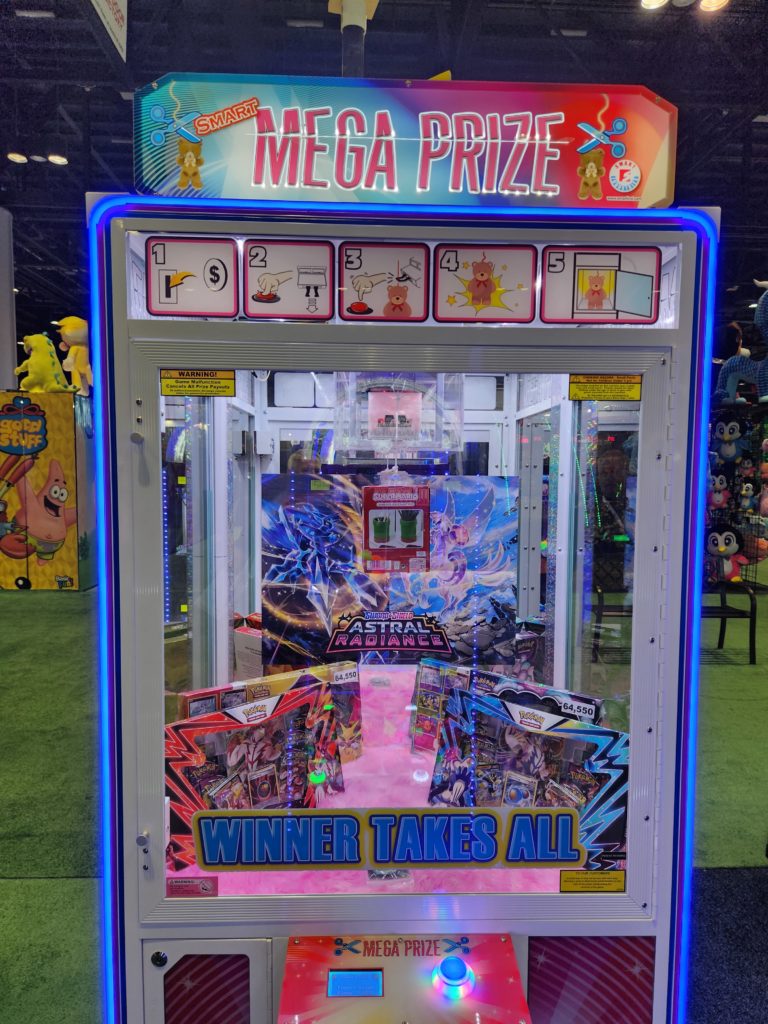
A close-up view of the prize shelf in the winner-takes-all version of Smart Industries’ Mega Prize. The player still must skillfully cut the string releasing the suspended prize, but in this model, doing so also lets the player win every prize put on the game’s shelf.
Smart: It’s been challenging, that’s for sure. We learned a lot from Covid, not only from how it affected our company, but also from how it related to our customers. We faced everything from supply chain problems and higher costs to difficulty maintaining our parts inventory from overseas. Whether it was containers on the ocean or trucking here in the U.S., we had to deal with rising and wild costs related to shipping. Now, like many companies, we’re dealing with a labor shortage. This is a new problem for us since we’ve always been able to find quality workers and it’s one that can affect our ability to grow.
With all that being said, we continue to work diligently to keep our costs down and maintain competitive pricing for operators and distributors. We’re still working through the challenges with the goal of getting life back to where it was pre-Covid. We’ve learned a lot in the process and are better prepared to adapt to future situations.
Dupree: During Covid, two key things were taking place at Smart. First, Jeff and I spoke frequently and he continually emphasized how important it was to stay connected to the customers. We spent a lot of time making sure that when we came out of Covid, we could transition into a working system.
The second thing has to do with quality. Everything we’ve done for as long as I’ve been working with Jeff has been focused on quality. It’s always part of the discussion from the initial part of a game’s design to the end. It never stops, continuing even after the designs are finished. Jeff is adamant about that. We want to make a profit but we won’t do so by making subpar product. There are no shortcuts when it comes to quality at Smart.
What, would you say is Smart Industries’ most significant contribution to the industry and the operator?
Smart: It’s the honor of supplying a product that completes the requirements operators need to generate a high level of profit. That’s done through innovation and good design. That’s the deal, right? We are in the business of designing games that make money for operators.
We’re best known for skill cranes, and we have over 40 years of experience producing them in many different styles and covering the trends within that product line. We strive within R&D to stay ahead of the curve by incorporating new ideas. That’s what we continuously work to do. Hopefully, we’ve succeeded at that and will continue to do so.
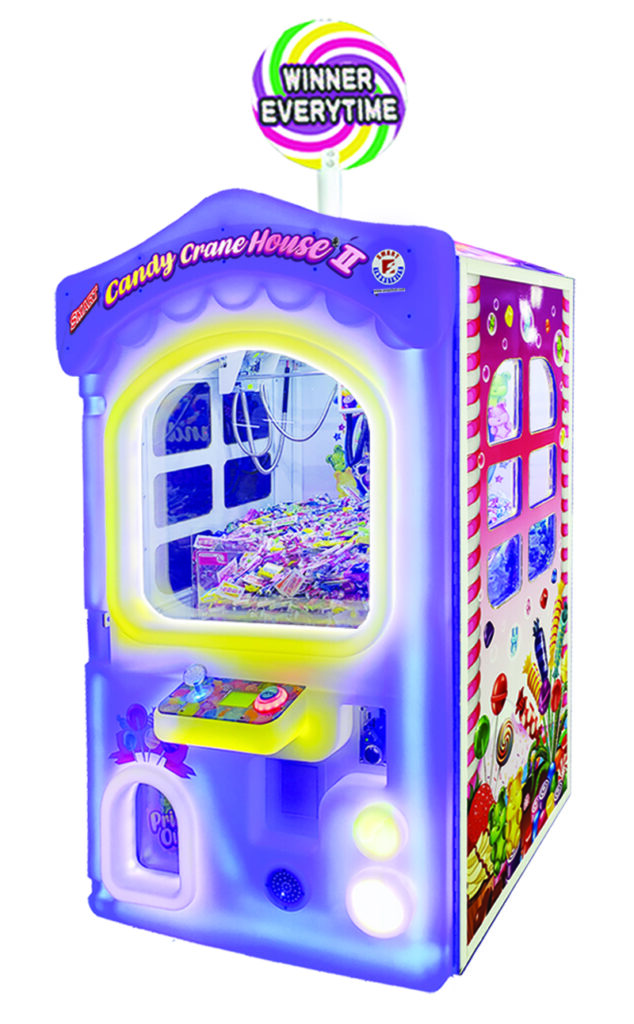
Smart Industries’ Candy House II
Today, we have over 25 models of cranes with various features, options and sizes to meet the different demands of street locations and FECs. That’s been our contribution and we hope to maintain that for operators and for our distributors.
Speaking of distributors, I can’t stress enough how important they are to our business. None of what we do would be possible without them. Learning through each distributor about their customers’ unique needs is high on the list of key ingredients to our success and we’re grateful for the relationships we’ve built with them over the years.
I also need to thank the hard-working, talented staff we have here at Smart Industries. They are our unsung heroes. The employees here in Iowa get the product ready to go out the door to customers – we don’t simply get product from our factory in Taiwan and ship it right out. Each game is tested here to ensure everything is fully functioning before we wrap it and send it off to our distributors. I also want to thank Jim Dupree, our VP of sales, and my son and factory manager, Jason Smart. They’re the ones who make it all work.
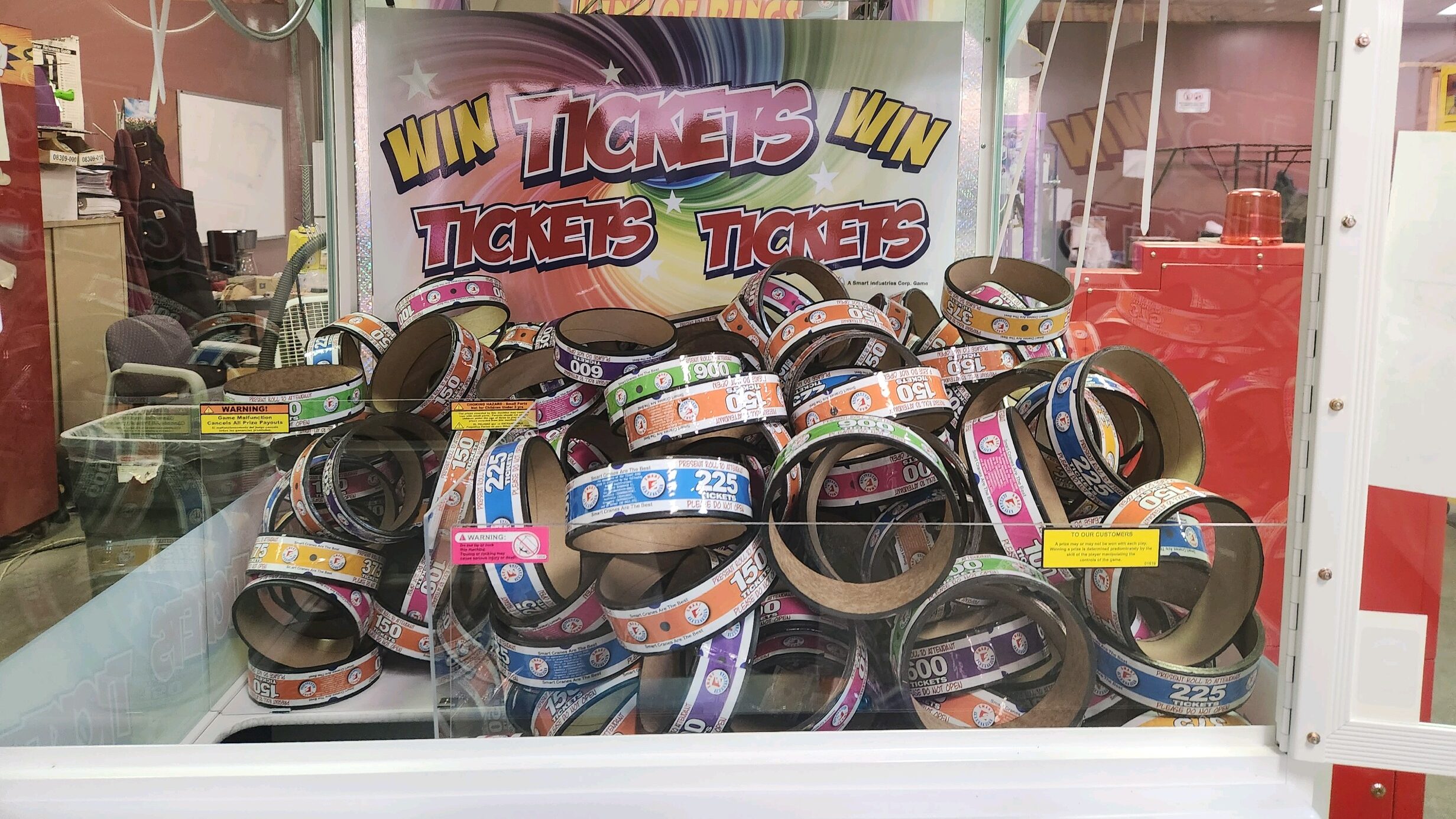 Jeff, can you talk about how your late father continues to impact the company today?
Jeff, can you talk about how your late father continues to impact the company today?
Smart: Working at Smart Industries is the only job I’ve ever had and as you would imagine, he was my number one mentor. I learned so much from him. Gordon had many talents and among them was building strong relationships with distribution. That’s something we value highly to this day and work hard to maintain. It means a lot that I can pass all I learned from him on to my son.
As I did, my son Jason is learning this business from the ground up. That’s something that’s pretty universal here and I think is among the reasons why we’ve been in business for over 40 years. Gordon built this business doing every job and so did I. Now my son is doing the same thing. When you come up within a company that way, you know firsthand what it takes to perform each job and how valuable each is to success.
Some readers might not know this, but Jim Dupree actually started here about 25 years ago as a technician. After that, he was sales liaison, VP of product development and now VP of sales, along the way, learning the many facets of our manufacturing and development processes. He has vast knowledge about what street operators and FECs go through and also works closely with our distributors to understand and meet their needs. When he talks about how important quality control is, he knows that from hands-on experience and the wisdom gained over the years. I could not replace that knowledge and Jimmy’s wonderful working relationship with his customers.
I’ll tell you this much: There are a lot of people who make it all work. Everyone here is an essential part of our success.
You both talk about the importance of listening to and working closely with your customers. Jim, can you elaborate on this?
Dupree: I can’t overstress the importance placed on customer support, which Jeff has always emphasized. Today’s higher volumes and hiring difficulties make this more challenging, but that priority has stayed the same. And even though Jeff now lives in Taiwan, we talk frequently. No matter the issue, he responds that we’ve got to take care of the customer, period. That is an essential part of Smart Industries and is the core of our identity. It truly is the only way to achieve long-term success.
Jim, along those lines, you and I have discussed the “cost of a service call.” Please elaborate on that.
Dupree: An operator’s equipment choice is more critical than just the initial purchase price. A lot of operators don’t realize that what they think they’re saving can be wiped out with a single service call.
Let’s say you buy a cheaper brand and save $150 on the price of a new crane. When it breaks on a Friday afternoon, it can result in a $300-400 loss depending on the location. You’ve thrown away whatever initial savings you thought you were getting. If that happens multiple times a year on a machine that’s high maintenance, it can cost you even more.
Buyers must understand that initial savings can be outweighed by the quality of goods, especially in a heavy service industry like ours. Fewer service calls result in more revenue. At Smart, we understand that, and it’s why we test all new equipment before it ships to our distributors and continually refine our game designs.
What’s on the horizon for Smart Industries?
Smart: I can honestly tell you that the best is yet to come. We’ve listened to our customers and, as I’ve said, work hard in R&D to stay ahead of the curve. So, what’s exciting for us as we look at products in development for this year and into 2024 is that our best is yet to come. I really mean that.
For more information on Smart products, including videos of the games in action, visit www.smartind.com or contact your distributor.

